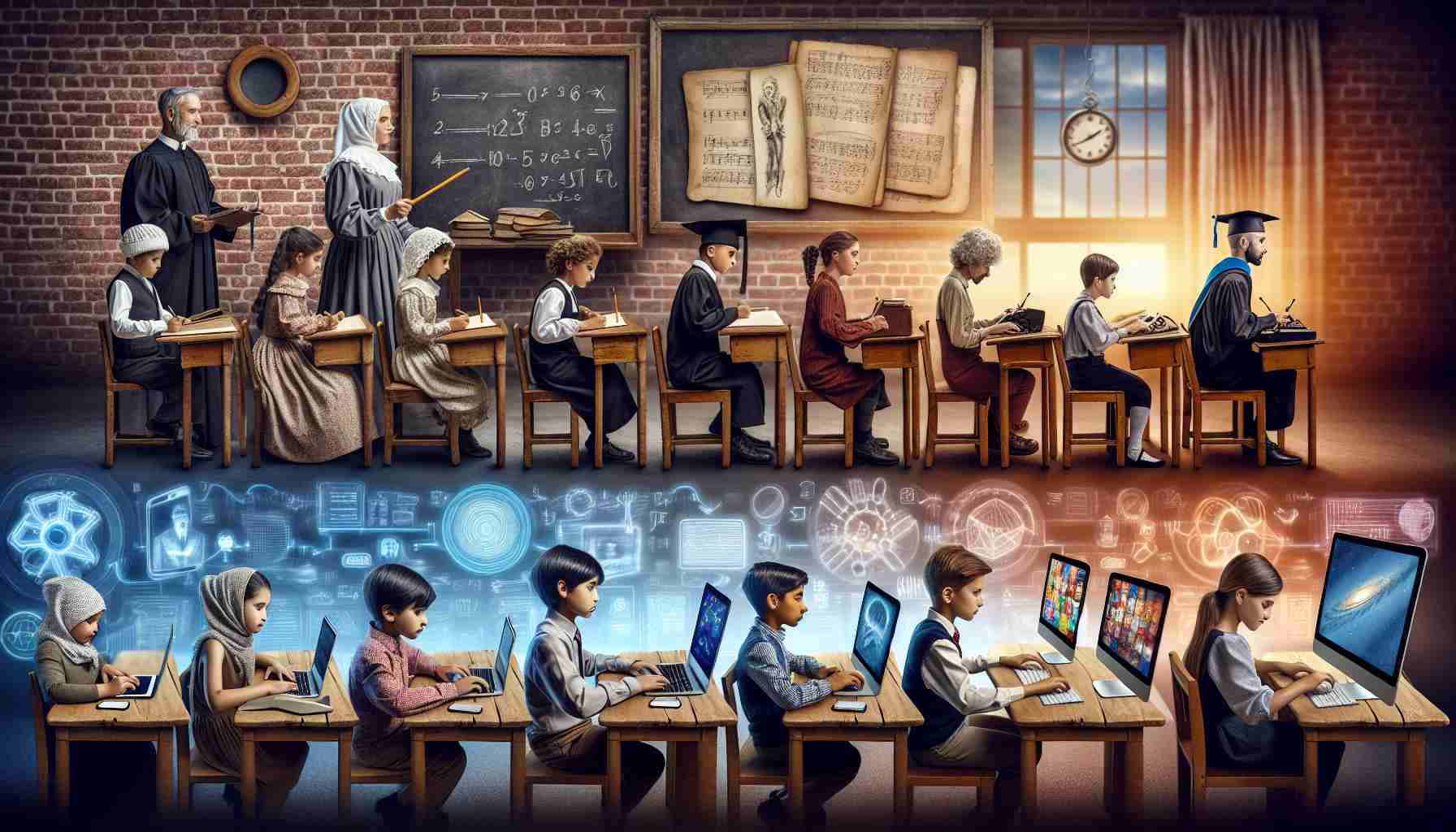In an era defined by rapid technological advancements, the landscape of education has transformed significantly. The integration of technology in educational settings has proven to enhance learning experiences and broaden access to knowledge, revolutionizing how educators teach and students learn.
The Rise of Online Learning Platforms
One of the most significant changes in education has been the emergence of online learning platforms. Platforms such as Coursera, edX, and Khan Academy provide access to a wide range of courses from prestigious institutions, enabling learners from around the globe to pursue education from the comfort of their homes. According to a report by the National Center for Education Statistics (NCES), enrollments in online courses have steadily increased over the years, reflecting a growing acceptance of digital learning. As of Fall 2020, approximately 35% of college students were enrolled in at least one online course, illustrating a significant shift in educational paradigms.
Technology in the Classroom
In addition to online learning, technology has drastically altered traditional classroom settings. Smartboards, tablets, and learning management systems are increasingly common in educational institutions. These tools facilitate interactive learning, allowing students to engage with the material actively. For example, interactive software can provide immediate feedback, helping students understand concepts more thoroughly.
Furthermore, educational apps and gamification techniques have emerged as effective instructional strategies. By transforming learning into an engaging activity, students are more motivated to participate and explore the subject matter. A study by the Joan Ganz Cooney Center found that children who engaged with educational games demonstrated improved problem-solving skills and a better understanding of complex ideas compared to their peers.
Bridging the Education Gap
Technology plays a crucial role in narrowing the education gap, particularly in underserved communities. Initiatives aimed at providing devices and internet access have surged, especially during the COVID-19 pandemic. The World Bank reported that countries that took proactive steps to leverage technology for education saw a lesser impact on learning outcomes during school closures.
However, the digital divide remains a challenge, as not all students have equal access to technology. Efforts are underway worldwide to ensure that every student has the tools necessary to succeed in a technology-driven educational landscape. Governments and non-profit organizations are collaborating to bridge this gap and provide equitable educational opportunities.
The Future of EdTech
Looking forward, the future of educational technology is bright. Innovations such as Artificial Intelligence (AI) and Virtual Reality (VR) are poised to further transform the educational experience. AI can provide personalized learning experiences by adapting content to meet individual student needs, while VR can create immersive learning environments that enhance engagement.
As we continue to witness these developments, it is essential for educators and institutions to embrace these technologies thoughtfully and ethically. By focusing on the efficacy and accessibility of technology in education, we can harness its full potential to cater to diverse learning styles and encourage lifelong learning.
In conclusion, the impact of technology on modern education is profound. From online learning platforms to classroom innovations and the push toward equitable access, technology has reshaped how education is delivered and received. As we navigate these changes, it is imperative to remain focused on fostering an inclusive and effective learning environment for all students.
Unlocking the Future: Tips, Hacks, and Facts about Technology in Education
As technology continues to reshape education, staying ahead of the curve can enhance learning experiences. Here are some practical tips, life hacks, and interesting facts to help you navigate this new educational landscape effectively.
Utilize Online Resources Wisely
Leverage the vast array of online learning platforms available. Besides popular ones like Coursera and edX, don’t overlook niche websites that offer specialized courses. A tip for maximizing online learning: create a study schedule similar to a traditional classroom timetable. This helps add structure to your learning and encourages regular study habits.
Engage with Interactive Tools
Incorporating technology such as smartboards and tablets can make learning more interactive. Seek out apps that prioritize engagement and gamification. Life hack: Pair educational games with traditional study methods. For instance, use a game to introduce a subject and follow up with quizzes or discussions to reinforce the material.
Stay Updated on Educational Technologies
With technology evolving rapidly, keeping up with the latest trends in EdTech is crucial. Subscribe to industry newsletters, webinars, and podcasts that discuss innovations in education technology. Interesting fact: EdTech investments have skyrocketed, indicating a growing recognition of its potential to enhance learning experiences.
Promote Digital Literacy
In this digital age, fostering digital literacy is essential for both students and educators. A tip to increase proficiency: Encourage students to explore various software tools and applications beyond the syllabus. Organize workshops or peer-led sessions where students can share their tech skills and learn from each other.
Addressing the Digital Divide
Participate in initiatives that promote equitable access to technology, especially in underserved communities. Life hack: Collaborate with local organizations or schools that provide technology and internet access to students in need. Your involvement can help bridge the education gap significantly.
The Role of Artificial Intelligence and Virtual Reality
Be open to the adoption of AI and VR tools in education. They can provide personalized learning experiences and immersive environments that enhance understanding. Interesting fact: Research shows that students using VR for learning demonstrate higher retention rates compared to traditional methods.
Encourage Lifelong Learning
Incorporate lifelong learning habits into your routine. Take advantage of online platforms to continuously acquire new skills. A tip for staying motivated: Join online communities or forums related to your fields of interest. Engaging with like-minded individuals can foster motivation and create networking opportunities.
In conclusion, as technology continues to revolutionize education, embracing it proactively can lead to enriched learning experiences. By utilizing these tips and acknowledging the potential of emerging tools, you can not only adapt to changes but also thrive in the educational advances of the modern era. Explore more related resources at edX for further insights into online learning.
The article has been updated: 2024-11-02 19:40
Here are some suggested related links for the post title “The Evolution and Impact of Technology on Modern Education”:
1. Edutopia – A comprehensive resource for educators, Edutopia provides insights and strategies on incorporating technology into teaching and learning.
2. Education World – An online resource offering articles, lesson plans, and news related to education technology and its influence on classrooms.
3. TeachThought – A platform that explores innovative teaching strategies and discusses the role of technology in education.
4. The Edvocate – A site dedicated to discussing the intersection of education and technology, offering articles on trends and advancements in educational technology.
5. LearnPlatform – A resource aimed at helping educators effectively leverage educational technology to enhance student learning outcomes.
6. EDUCAUSE – A nonprofit association that helps higher education optimize the use of information technology to support teaching and learning.
7. Chalkbeat – A nonprofit news organization that covers educational change and the impact of technology on schools and student learning.
8. Common Sense Education – An organization that provides resources to help educators and parents understand and implement technology in teaching.
9. Tech & Learning – A publication covering the latest trends in educational technology, offering insights to help teachers implement new tools in their classrooms.
10. Open Colleges – An educational organization that focuses on the use of technology and online learning environments in vocational education.
These links provide valuable insights and resources related to the impact of technology on modern education.
The article has been updated: 2024-11-05 13:08
How has technology transformed the way we approach education in modern times?
The evolution of technology has significantly transformed education by introducing innovative teaching methods, enhancing accessibility, and personalizing learning experiences. Online learning platforms, educational apps, and digital resources allow students to access a wealth of information from anywhere in the world. Additionally, interactive tools such as virtual reality (VR) and gamification have made learning more engaging and effective. Technology also facilitates collaboration among students and teachers through various communication tools, making it easier to share ideas and work together on projects. Overall, technology has made education more flexible, inclusive, and tailored to individual learning needs, thereby greatly impacting how knowledge is acquired in the modern era.



















